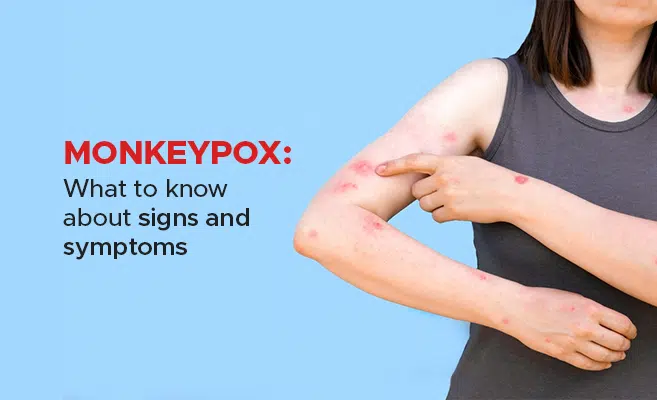Monkeypox: What to Know About Signs and Symptoms

Humans globally are getting gripped by one virus after another. While the terminal COVID-19 is still changing its variant, and the world is battling its menace, Monkeypox is here to create fear and havoc among people.
The virus belongs to the Poxviridae family and is a member of the Orthopoxvirus genus. Thus, it is related to cowpox virus, variola virus and vaccinia virus as they stem from the similar family.
Monkeypox is a rare disease caused by monkeypox virus infection, its a member of the Orthopoxvirus genus in the Poxviridae family. Variola virus (which causes smallpox), vaccinia virus (used in the smallpox vaccine), and cowpox virus are all members of the Orthopoxvirus genus.
However, what is unknown is the Monkeypox’s natural reservoir. However, there’s a theory that non-human primates (monkeys precisely) may be the carriers to infect human race.
Signs and Symptoms of Monkeypox
Determining monkeypox is difficult because its symptoms are peculiar and its signs are milder compared to smallpox.
Some of the symptoms are listed below:
- Exhaustion
- Muscle aches
- Headaches
- Fever
- Swollen lymph nodes
- Backache
- Chills
- Rashes
When compared to smallpox, monkeypox causes swollen lymph nodes. Its incubation period ranges between 5-21 days. That means, infection remains until then before subsiding gradually.
Moreover, when someone suffers from the issue, rashes start to appear between 1 to 3 days. They appear after the fever caughts up. It begins from the face and subsequently spreads to the entire body.
Here’re the stages of lesions:
- Scabs
- Pustiles
- Vesicles
- Macules
- Papules
How To Prevent Monkeypox Virus
Before the monkeypox virus goes rampant, it is important to follow some preventive actions to stop it from spreading.
- Never come in contact with a stray animal that is susceptible to the infection.
- Take care that sick animals are not near your vicinity
- Do not touch materials or things that came in touch with deceased animals
- Keep infected patients isolated
- After coming into contact with infected animals or humans, practise good hand hygiene.
Washing your hands with soap and water, for example, or using an alcohol-based hand sanitiser.
When caring for patients, wear personal protective equipment (PPE).
Monkeypox Treatment
In the absence of specific therapy, many people infected with the monkeypox virus experience a mild, self-limiting disease course.
However, the prognosis for monkeypox is dependent on a number of factors, including previous vaccination status, initial health status, concurrent illnesses, and comorbidities.
Following consultation with the CDC, the following individuals should be considered for treatment:
- People suffering from a serious illness (e.g., hemorrhagic disease, confluent lesions, sepsis, encephalitis, or other conditions requiring hospitalization)
- Individuals at high risk of severe disease:
- Persons with immunocompromise (e.g., human immunodeficiency virus/acquired immune deficiency syndrome infection, leukaemia, lymphoma, generalised malignancy, solid organ transplantation, therapy with alkylating agents, antimetabolites, radiation, tumour necrosis factor inhibitors, high-dose corticosteroids, hematopoietic stem cell transplant recipient is less then 24 months post-transplant or greater or equals to 24 months but with graft-versus-host
- Pediatric patients, particularly those under the age of eight,
- Women who are pregnant or breastfeeding
- Persons suffering from one or more complications (for example, secondary bacterial skin infection; gastroenteritis with severe nausea/vomiting, diarrhoea, or dehydration; bronchopneumonia; concurrent disease or other comorbidities)
- Individuals with monkeypox virus aberrant infections, such as accidental implantation in the eyes, mouth, or other anatomical areas where monkeypox virus infection may pose a special risk (e.g., the genitals or anus)
Conclusion
If you find anyone with monkeypox or you yourself has the signs that indicates you might be suffering from such a disease, it is crucial to reach out to the local government clinic or to your personal doctor.

 Book An Appointment
Book An Appointment Virtual Consultation
Virtual Consultation





